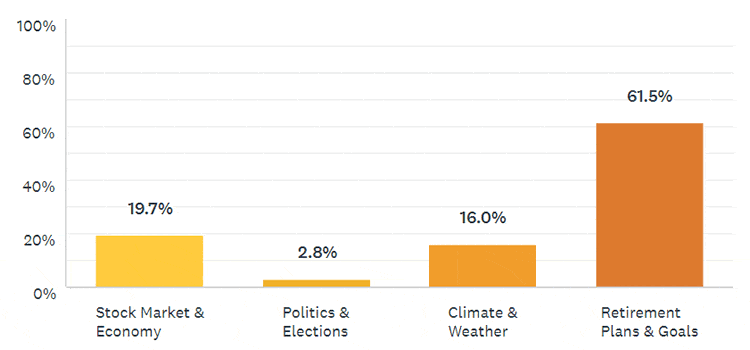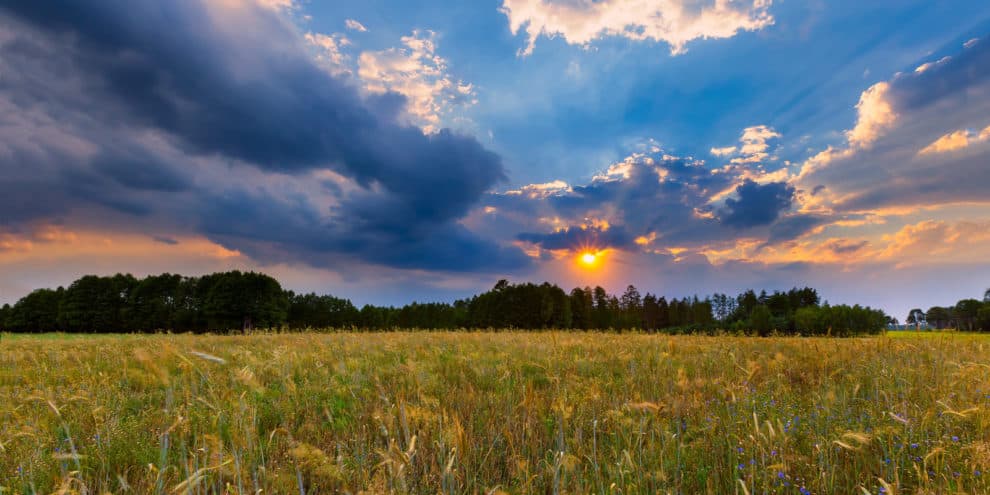The May LANDTHINK Pulse revealed that 61.5% of respondents say their retirement plans and goals affect their motivation to purchase rural land. Everyday in America, 10,000 baby boomers turn 65 and begin counting down the minutes to retirement. People are adopting healthier lifestyles and living longer than previous generations, and it is shaking up retirement planning. Many are now taking into consideration that they will likely spend thirty years or more in retirement, and younger generations are starting to plan earlier for their new life adventures that will begin after retirement.
Most Americans work their whole lives so they can retire, but “retirement” looks different for everyone. Dreaming and planning the transition into the next phase of your life can be exciting, but there are questions that should answered before signing on the dotted line for official retirement, including:
- When you should retire
- Where you want to retire
- How do you want to spend most of your time?
- Is it close enough for family and friends to visit?
- How much can you afford? (and the equation includes you not working)
Last month, the May Pulse asked: Which factor is most likely to influence your interest in buying rural land?
May Pulse Sponsored by
More people are choosing to invest in income-producing rural land to help save for retirement, with the added bonus of owning a piece of property that will eventually become their retirement haven. Land is a low-maintenance tangible asset, a hedge against inflation, and a unique investment capable of generating multiple streams of income. Those money-making possibilities can help finance the retirement lifestyle you want to live. The land itself has value and anything it potentially produces has a separate value.
Timberland is a stable, relatively low-risk investment to add to an investment portfolio, and it can can provide a landowner with steady returns for many years, but it should be purchased at least 10 or more years ahead of retirement. There are variable costs associated with a timberland property, such as planting and precommercial thinning, but once the trees reach maturity, the stand will provide steady returns. Sustainably managed timberland can provide excellent wildlife habitat for hunting and recreational opportunities like ATV trails, horseback riding, hiking, and more activities for you and your family to enjoy ahead of retirement and for future generations.
For those thinking about buying a homestead or farmland as a retirement strategy, there’s no shortage of opportunities. Farmland can not only provide income from conventional and speciality crops grown on a large scale but it’s also good for those who want to turn their love of growing crops and plants into a small business after retirement. This type of land can also provide rental income from things like livestock grazing to wind power or natural gas rights. Farmland can sometimes have higher returns than stocks do, but investors in agriculture face much different risks than those in the stock market. However, geographic and commodity diversification can help protect your money from natural disasters and a decline in crop prices.
Whether you’re buying rural land to earn money you can sock away for retirement or if you decide to hold on to it for appreciation or sell it for a profit down the road, you have to be patient before you can earn from the land. If you’re considering buying land for retirement, it’s advisable to do so as soon as you can. This is often hard to do, since many circumstances are subject to change, but some make the decision easier by starting it as a second home that can become their retirement place. As land consultant and author Curtis Seltzer explains, the advantages of extending your second home into your retirement residence are many.
If you’re thinking about buying rural land as a way to diversify your retirement portfolio, “Everything from pre-construction, condominiums, and rental properties to rehabs, lease options, and raw land are held inside of tax-advantaged IRAs and 401(k) plans,” as Patty McCrystal explains in Raw Land and Retirement Plans. “When it comes to diversifying a retirement portfolio, raw land is about as close to a mutual fund as an investor will get. Raw land is an asset that can be purchased and held for the long term, without the worry of unexpected repairs or expenses. Whether it’s a lot in a planned development near Destin, Florida, or a large track of farmland outside of Topeka, Kansas, land provides a simple way to diversify a stock-heavy portfolio.”
Coming in a distant second, 19.7% of respondents indicated that the stock market and economy was likely to influence their interest in purchasing rural land. The real estate market is affected by the broader economy. A bull market for stocks is a clear reflection of the confidence investors in the current presidential administration’s economic agenda. Just last year, the low unemployment rates, global economic growth and soaring corporate profits had optimistic investors piling into stocks. Market analysts dubbed the stock market mini-boom the “Trump Bump.”
Real estate has always played an integral role in the economy. The housing market and the rural land market are largely affected by unemployment rates, interest rates, consumer confidence, and income. With job opportunities and rising incomes, comes greater demand for land. Land becomes attractive to buyers, including large investors, who are in a position to purchase and take out a loan, feeling confident in the forecast of the overall economy and projected outlook for the real estate market.
In a sluggish economy, the supply of money tends to become more restrictive. If it’s harder for buyers to borrow money, land sales falter. When stricter lending requirements are in place, fewer buyers are available and land inventory goes up and takes longer to sell. A strong overall economy, like we’re currently experiencing- with increased income, spending power, and consumer confidence- typically lead to a healthy real estate market.

The LANDTHINK audience strongly expressed their opinion on the factor most likely to influence their interest in buying rural land. The majority of our audience, 61.5% of respondents, indicated they would mostly take into consideration their retirement plans and goals. Coming in second, 19.7% said they would take into account the stock market and economy when thinking about buying rural land. Only 16.0% said climate & weather would affect their buying interest, followed by a mere 2.8% that indicated politics & elections.
We were pleased that so many people chimed in on this question, and we thank everyone who answered the Pulse and shared it on social media with friends and connections in the land industry. LANDTHINK would like to extend a big thank you to The Land Show with Dave and Johnny for sponsoring the May Pulse and for coming up with a very interesting question to pose to our audience. The show can be heard throughout the state of Alabama on Saturday mornings. Visit their website for a list of the locations and stations. Dave Milton and Jonathan Goode, land agents with Southeastern Land Group, host the show and want to introduce land investing to capable investors and help land owners reach true market potential when listing their properties.
Become a Pulse sponsor! It’s a great way to ensure your brokerage is the first one buyers and sellers call when they have a need to buy or sell property. You’ll get insane exposure on Social + Email + Web. That’s 500,000+ monthly eyes on you! Once you have it, you won’t want to give it up! Pulse sponsorships are offered on a first come first serve basis and are subject to certain limitations. If your business would be interested in sponsoring a Pulse question, please contact us soon.
Do you have a Pulse question you’d like to suggest? Submit your question and we might choose yours!
We want to know what you think about our June Pulse question, chosen and sponsored by Mossy Oak Properties: How far would you be willing to travel to use your recreational property? Answer now.
This content may not be used or reproduced in any manner whatsoever, in part or in whole, without written permission of LANDTHINK. Use of this content without permission is a violation of federal copyright law. The articles, posts, comments, opinions and information provided by LANDTHINK are for informational and research purposes only and DOES NOT substitute or coincide with the advice of an attorney, accountant, real estate broker or any other licensed real estate professional. LANDTHINK strongly advises visitors and readers to seek their own professional guidance and advice related to buying, investing in or selling real estate.











Add Comment